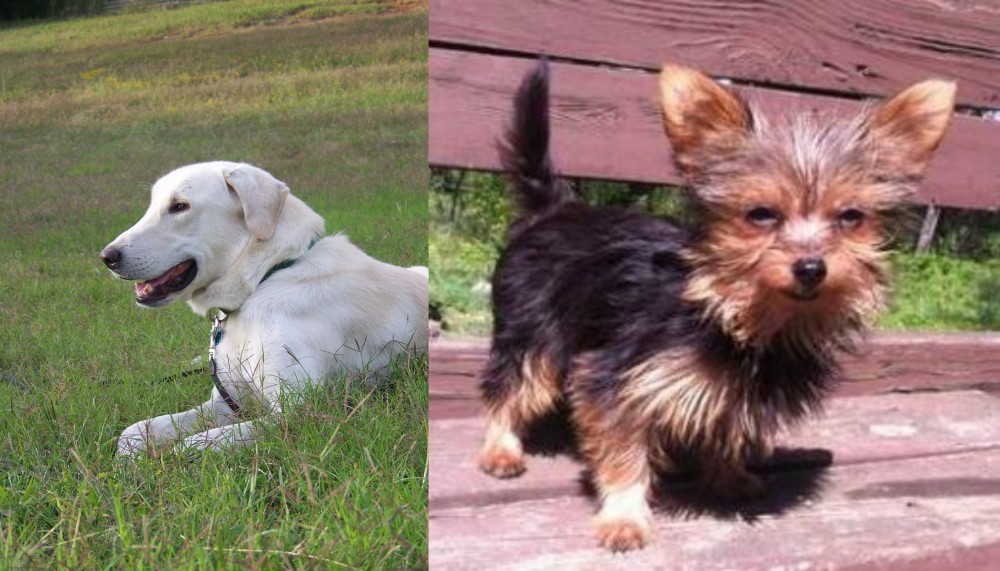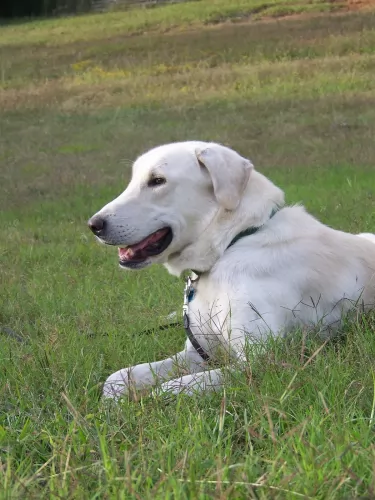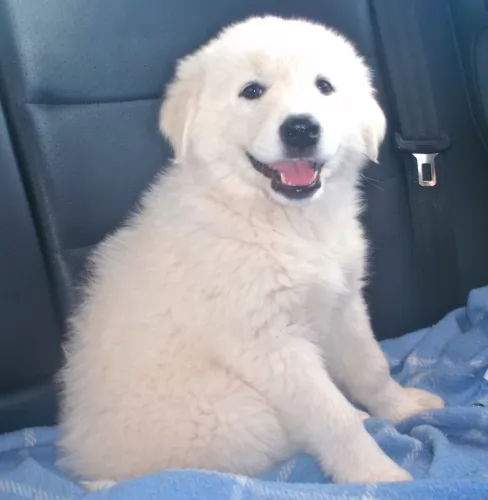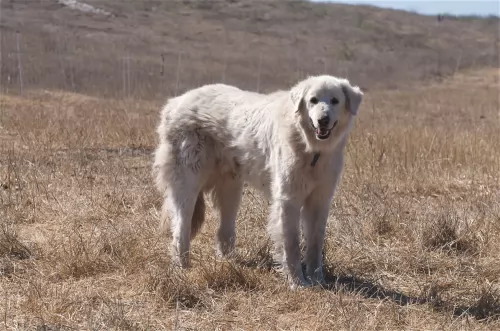 Petzlover
Petzlover Akbash Dog is originated from Turkey but Chorkie is originated from United States. Akbash Dog may grow 75 cm / 30 inches higher than Chorkie. Akbash Dog may weigh 56 kg / 124 pounds more than Chorkie. Both Akbash Dog and Chorkie has almost same life span. Akbash Dog may have more litter size than Chorkie. Akbash Dog requires Moderate Maintenance. But Chorkie requires Low Maintenance
Akbash Dog is originated from Turkey but Chorkie is originated from United States. Akbash Dog may grow 75 cm / 30 inches higher than Chorkie. Akbash Dog may weigh 56 kg / 124 pounds more than Chorkie. Both Akbash Dog and Chorkie has almost same life span. Akbash Dog may have more litter size than Chorkie. Akbash Dog requires Moderate Maintenance. But Chorkie requires Low Maintenance
 Akbash breed became popular in the 1970s. Around that period, Akbash was introduced to North America. There is archeological evidence that this breed was popular even in the 750-300 BC. Of course, it wasn’t the exact dog as we know it today, but there are many similarities between Akbash and dog from the ancient period. This breed was developed in Turkey to be a guardian dog. They were perfect flock guardians.
Akbash breed became popular in the 1970s. Around that period, Akbash was introduced to North America. There is archeological evidence that this breed was popular even in the 750-300 BC. Of course, it wasn’t the exact dog as we know it today, but there are many similarities between Akbash and dog from the ancient period. This breed was developed in Turkey to be a guardian dog. They were perfect flock guardians.
 The Chorkie is a very popular little dog but he is not a purebred. The Chorkie was developed by crossing the Yorkshire Terrier with the Chihuahua. Probably the most popular Chorkie ever was the Taco Bell dog in the 1990s. This hybrid is a young breed created in the late 1900’s. These small, toy dogs are great lapdogs. It’s not possible to know the exact heritage of the Chorkies but the initial crossing of the two breeds occurred in the early part of the 20th century.
The Chorkie is a very popular little dog but he is not a purebred. The Chorkie was developed by crossing the Yorkshire Terrier with the Chihuahua. Probably the most popular Chorkie ever was the Taco Bell dog in the 1990s. This hybrid is a young breed created in the late 1900’s. These small, toy dogs are great lapdogs. It’s not possible to know the exact heritage of the Chorkies but the initial crossing of the two breeds occurred in the early part of the 20th century.
The Chorkie makes a great indoor pet best suited for the single or elderly person. Not because the Chorkie does not like children but because they are so small they can be easily injured by children. They are continuing to grow in popularity all the time among those who enjoy the new designer dogs.
 Weight of the Akbash dog variates from 41-64kg, while their height is 71-78cm. Female Akbash is smaller than a male Akbash, but not for much.
A lifespan of an average Akbash dog is 10-11 years, but if they have cared properly, they tend to live longer.
Litter Size of Akbash is 8-9 puppies.
Another Name for Akbash is Akbas Coban Kopegi, Coban Kopegi.
Weight of the Akbash dog variates from 41-64kg, while their height is 71-78cm. Female Akbash is smaller than a male Akbash, but not for much.
A lifespan of an average Akbash dog is 10-11 years, but if they have cared properly, they tend to live longer.
Litter Size of Akbash is 8-9 puppies.
Another Name for Akbash is Akbas Coban Kopegi, Coban Kopegi.
 As mentioned previously the Chorkie is a mix between the Yorkshire Terrier (Yorkie) and the Chihuahua. They Tend to look more like the terrier than the Chi with a small head carried high on a well-proportioned body, with the long silky hair of the Yorkie. Their head carried the shape of the Chihuahua. Like the Chihuahua, they have mostly pointed ears although some Chorkies have droopy ears. The Chorkie coat is silky, long, and can be in a variety of colors. The ears are either fringed like the Yorkie or smooth like the Chihuahua.
As mentioned previously the Chorkie is a mix between the Yorkshire Terrier (Yorkie) and the Chihuahua. They Tend to look more like the terrier than the Chi with a small head carried high on a well-proportioned body, with the long silky hair of the Yorkie. Their head carried the shape of the Chihuahua. Like the Chihuahua, they have mostly pointed ears although some Chorkies have droopy ears. The Chorkie coat is silky, long, and can be in a variety of colors. The ears are either fringed like the Yorkie or smooth like the Chihuahua.
 Have in mind that Akbash is a large and powerful dog. They are bred through generations to be guardians and suspicious. They are very independent because they tend to make their own decisions while guarding flocks. They will require adequate socialization, but overall, they are very intelligent and they tend to learn quickly. It requires time and patience, but are great pets for right owners. Akbash has a white to biscuit color coat. They also have a dark pigment around nose, eyes, and mouth. Akbash is very quick and agile dog, which might be surprised because of its size.
Have in mind that Akbash is a large and powerful dog. They are bred through generations to be guardians and suspicious. They are very independent because they tend to make their own decisions while guarding flocks. They will require adequate socialization, but overall, they are very intelligent and they tend to learn quickly. It requires time and patience, but are great pets for right owners. Akbash has a white to biscuit color coat. They also have a dark pigment around nose, eyes, and mouth. Akbash is very quick and agile dog, which might be surprised because of its size.
It is important to train them since the puppyhood. They are working dogs and they will be happy when they have tasks during training. Due to their independence, consistent and steady training is important. An old-fashioned way of training that includes punishment is not recommendable. Positive training with awards is the best way to train your Akbash dog. They do not require a lot of daily exercises. Daily walks would do more than enough. Younger dogs need more exercise than more mature ones. They can be very good for other animals, but they have to be socialized with them. It is the best way to socialize your dog when it is still a puppy.
 Remember that the Chorkie is a cross breed and not a purebred. Its temperament is that of a mixed breed dog which is usually laid back and mellow. The Chorkie might bark a lot as both the Yorkshire and the Chihuahua are known to bark. It can carry the traits of either or both of its parents.
Remember that the Chorkie is a cross breed and not a purebred. Its temperament is that of a mixed breed dog which is usually laid back and mellow. The Chorkie might bark a lot as both the Yorkshire and the Chihuahua are known to bark. It can carry the traits of either or both of its parents.
The Chorkie is a great lap dog though he can be stubborn and wear their owner out with all their energy. They are playful and willful and need strong leadership despite their small size. They will bark at anything they find to be suspicious. Despite their size they are highly intelligent and very loyal, affectionate dogs. They love their people and will not like it if you leave them alone very often. They are quite brave to the point of being reckless and can be aggressive toward dogs a lot bigger than they are. Due to their courage and their barking they are great family dogs.
 Akbash dog is very easy to care. They can stay fit on a minimum amount of food. 2-2.5 cups divided into two meals would be ideal for your dog. They require meat, so giving them dry industrial food can be a solid substitute. Vegetables and oil can also be included in meals. It will keep your dog healthy and happy.
Akbash dog is very easy to care. They can stay fit on a minimum amount of food. 2-2.5 cups divided into two meals would be ideal for your dog. They require meat, so giving them dry industrial food can be a solid substitute. Vegetables and oil can also be included in meals. It will keep your dog healthy and happy.
Puppies have to eat more meals per day. It is the best to give your puppy Akbash 3-5 meals per day. Those meals should be divided into smaller portions. It is recommended to give your puppy all necessary vitamins and minerals that include calcium for stronger bones. It will improve the overall health of your dog, and it will help it develop into a healthy adult dog.
Akbash will request some grooming, but they are not very difficult to groom. They require regular grooming. Every few days will be enough, except when they are shedding. Akbash will need daily grooming when shed. You can bath your pet occasionally, but not very often. Bathing, if necessary, should be done only 5-6 times a year. There is no need for more.
 These small dogs have a lot of energy and need to eat a food that is high in quality calories. No empty calories for these guys. Feed them at least twice a day and no more than a fourth of a cup of dry food for the entire day. They can become overweight easily so do not overfeed.
These small dogs have a lot of energy and need to eat a food that is high in quality calories. No empty calories for these guys. Feed them at least twice a day and no more than a fourth of a cup of dry food for the entire day. They can become overweight easily so do not overfeed.
Additional health issues might include knee cap dislocation leading to arthritis or lameness and a tendency to develop low blood sugar.
Again, these are high energy little dogs. They need to be exercised or at least have brisk play inside the house. They excel at competitive games such as barn hunt, agility and obedience.